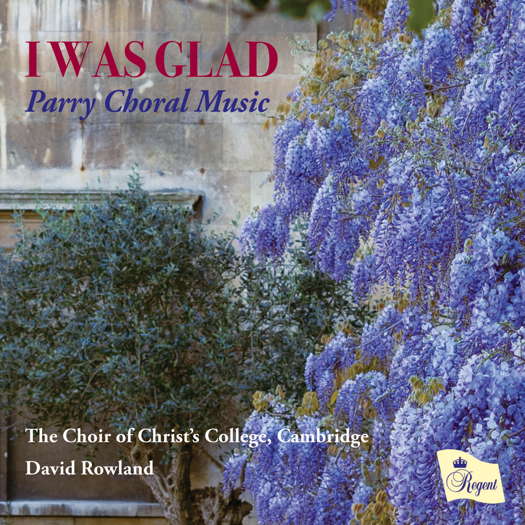- Sterling Records
- Melodiya
- Felice Romani
- San Francisco Opera
- Biber
- Simon Callaghan
- Paris Museum of Music
- Jay Anthony Gach: HaShir HaShem Luchem
 DISCUSSION: Defining Our Field - what is 'classical music' to us, why are we involved and what can we learn from our differences? Read John Dante Prevedini's essay, watch the panel discussion and make your own comments.
DISCUSSION: Defining Our Field - what is 'classical music' to us, why are we involved and what can we learn from our differences? Read John Dante Prevedini's essay, watch the panel discussion and make your own comments.
ARTICLES BEING VIEWED NOW:
- Régine Crespin
- Hector Berlioz
- Ruth Railton
- Marián Varga
- Profile. A Very Positive Conductor - Paul Bodine talks to Los Angeles Opera's Music Director Designate, Domingo Hindoyan

Sensitively Recorded
GERALD FENECH enjoys the choral music of Hubert Parry
'The results are truly stirring and the renditions are consistently warm and poignant ...'
Hubert Parry (1848-1918) was one of the key figures in the British musical renaissance of the late nineteenth and early twentieth centuries, as composer, educator and writer. Born into landed gentry, he studied at Eton and Oxford and under family pressure went into the City, before the growing success of his compositions allowed him, in 1877, to devote himself full-time to music.
He was a major contributor to the first Grove's Dictionary of Music which began publication in 1879, and later wrote several books on musical history and aesthetics. He joined the staff of the Royal College of Music when it was founded in 1883, and was director from 1895 until his death. He was also Professor of Music at Oxford from 1900 to 1908.
Generations of students came under the spell of his warm, generous personality and his insistence on the artist's moral responsibility to society. Indeed, in a 1905 lecture by Elgar, he called Parry 'the head of our art in this country'.
Listen — Hubert Parry: I was glad
(REGCD580 track 1, 1:22-2:16) ℗ 2024 Regent Records Ltd:
Parry's music and style was influenced primarily by the great German tradition, from Buxtehude to Brahms and even Wagner, at a time when most English musicians considered the latter beyond the pale. Much of his output consists of choral music: oratorios, motets, anthems, service music, sacred and secular cantatas, part-songs and hymns. Parry was also a symphonic composer and he also wrote four symphonies, a symphonic fantasia, a set of symphonic variations and other orchestral works; music for piano, organ and various chamber ensembles; and twelve sets of English lyrics, an important component of the English song repertory.
After his death in 1918 aged seventy, Parry was largely forgotten for many years - thanks mainly to a series of misconceptions. He was viewed as an all-too-conventional Victorian gentleman, when he could more accurately be ranked with Ruskin and Darwin as a Victorian radical. He was agnostic and politically liberal, and had a particularly deep, introspective side to his character. He was also coupled with his more conservative and irascible contemporary Sir Charles Villiers Stanford as the joint precursor of a British revival that was considered to have begun in earnest only with Elgar and Vaughan Williams.
This beautiful issue focuses mainly on choral works that are much loved and performed such as Blest Pair of Sirens, I was Glad, Hear my words, ye people and the immortal Jerusalem - together with a rarity, the moving part-song Music, when soft voices die.
Listen — Hubert Parry: Music, when soft voices die
(REGCD580 track 4, 0:01-0:44) ℗ 2024 Regent Records Ltd:
What about the Songs of Farewell which also make part of this inspiring programme? Indeed, these songs have been, for twenty years, a repertoire piece for the Chapel Choir of Christ's College, Cambridge. For this recording, former members of this choir were invited to join, bolstering the number of singers to over one hundred. The results are truly stirring and the renditions are consistently warm and poignant, with the music flowing like a limpid stream in a flowery meadow, thanks to Rowland's immaculate conducting which keeps things moving with unerring precision and clarity.
Listen — Hubert Parry: I know my soul hath power to know all things
(Songs of Farewell)
(REGCD580 track 6, 0:00-0:37) ℗ 2024 Regent Records Ltd:
A sensitively recorded addition to the Parry discography that should open the way for newcomers to this composer's music to delve deeper into the choral beauty of this sumptuous repertoire. Sound and presentation are as invariably satisfying as the music itself.
Copyright © 20 September 2024
Gerald Fenech,
Gzira, Malta



